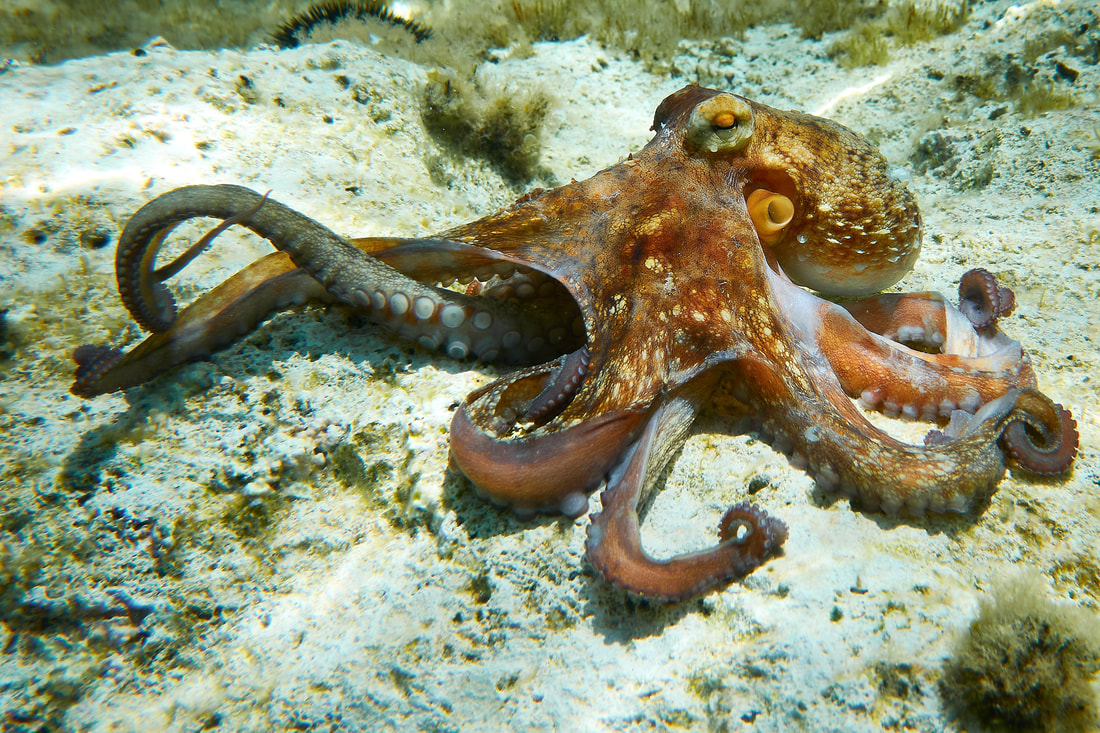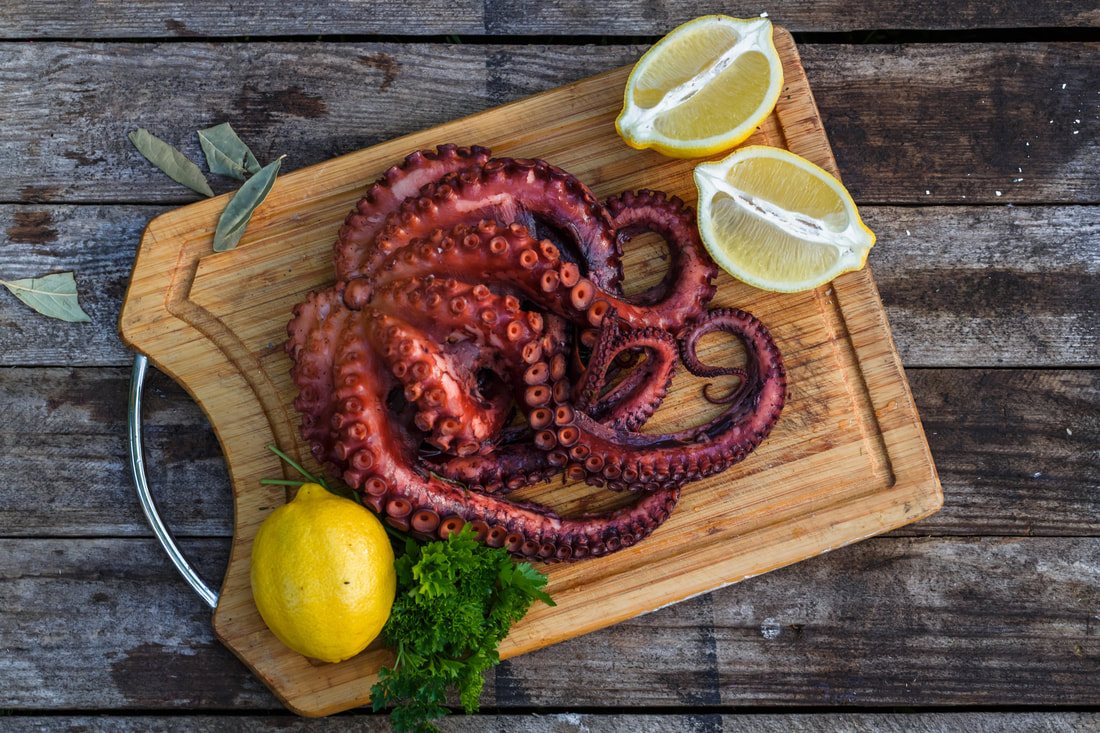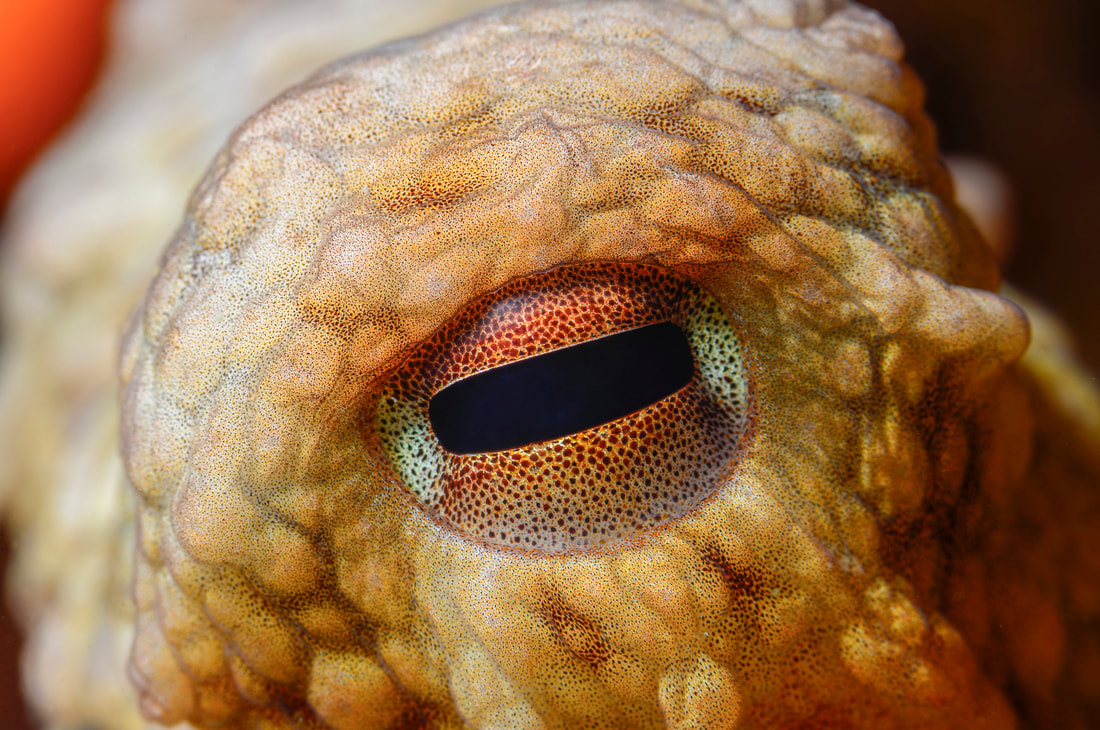We love them in our documentaries and on our plates.You may remember back in December 2021 a surge of articles popped up across all media outlets from niche animal rights sites to the BBC and Daily Mail, talking about the world’s first octopus farm coming to Spain. Understandably, there was extreme pushback against this with petitions appearing all over the internet and, for a day or two, social media was inundated with angry posts about how unethical this proposition is. This article will explore the proposed octopus farm, the issues behind it, and what the public's outrage reveals about our ethics. Our love for octopuses
Recognising faces Along with a large number of anecdotes from people who work at aquariums, scientific research has shown that octopuses are able to recognise different people and behave differently towards them [1]. A study found that they would respond differently to people who had either been known to feed them or to irritate them, this was despite the fact that the humans wore identical uniforms [1]. This implies that they can recognise faces and remember how different people treat them and modify their behaviour accordingly. It is therefore no surprise that research has also shown that they are able to recognise different individual octopuses [2]. Beyond the scientific research, there are countless anecdotes of captive octopuses consistently squirting water at certain people, whilst hiding from others. Tool use We often associate tool use with intelligence and frequently see videos of monkeys using stones to crack nuts and crows/ravens doing similarly and even bending twigs into hooks to retrieve food. Such abilities are not often observed in the invertebrate world, but cephalopods buck this trend. There are several examples, but one of the coolest has to be how octopuses have been observed using two halves of a coconut as shelter. Octopuses in Indonesia have been recorded carrying gastropod shells, two halves of a coconut, or human detritus over considerable distances, resulting in them modifying their “walk” and, when startled, assembling these items into a temporary shelter [3]. Not only is this fascinating to see but the fact that they carry the objects around in a “non-functional” state for future use and have to assemble the shelter for it to be effective, displays an unusual level of foresight and tool use. Escapism, problem solving, and more There are a plethora of octopus videos, anecdotes, and scientific studies out there exhibiting the remarkable skills of octopuses. From squeezing their bodies through the tiniest holes, to sneaking out of their tanks to steal fish, opening jars from the inside, to solving complex problems. They also display an absolutely incredible ability to change colour, both to display mood and as mind-blowing camouflage. I will link interesting articles and videos at the end in case people want to read and watch examples of octopuses being clever. The Farm I can’t cover every example of incredible cephalopod behaviour without this becoming a very long article but hopefully those above give a good representation of their abilities, which in no small part, have contributed to our fascination with these creatures. Recently, however, octopuses have been in the news, not because of their intellect, but because of a controversial farm opening in Spain. Late in 2021, the Spanish multinational, Nueva Pescanova group (which specialises in fishing, farming, processing, and marketing seafood) announced their plans to open the world’s first commercial octopus farm. It has been reported that they will produce up to 3,000 tonnes of octopus each year and the company claims that farming octopuses will reduce the impact on the wild populations. However, a closer examination reveals that their claims don’t stand up to scrutiny.
Ethical issues Interestingly, the ecological impact is not what has caused the large backlash against this proposed farm, instead, the outcry of it being unethical has taken centre stage. This was surprising to see as normally people focus more on environmental issues as, when it comes to animal farming, it is often the easier route to public support. However, in the case of the octopus farm, articles were quoting scientists and conservationists claiming that there is no ethical way to farm these incredible animals which have been shown to feel pain and be "sentient”. Additionally, despite several requests by the BBC, Nueva Pescanova would not release any details on how the animals would be kept, fed, or killed, further raising concerns. The boneless body of an octopus would make housing many individuals in a small space very difficult as they are very susceptible to being crushed. Furthermore, they are territorial, solitary animals, again adding to the ethical difficulties when it comes to keeping large numbers. Finally, as seen above, they are known to be particularly intelligent, therefore being deprived of any stimulation would likely result in significant psychological problems for the octopuses. All of these factors point towards it being unethical to commercially farm octopuses and scientists, animal lovers, and the public all seem to be in agreement that this shouldn’t go ahead. This large outcry over the ethics seen by the public does, however, reveal our hypocrisy when it comes to how we view animals. Whilst it pleases me to see such strong opposition against the farm, I imagine that a lot of the people angry, also consume octopuses and squid. Additionally, I find it hard to believe that a similar level of backlash would be seen if a new industrial pig, cow, or salmon farm was being opened instead. Many of the problems being used to argue against the octopus farm are commonplace in the rest of animal agriculture. Pigs repeatedly score higher than dogs on various intelligence tests, yet are kept in small, tightly packed barns in farms, starved of any stimulation, and inside investigations continually show how poorly they are treated. Salmon farms are repeatedly documented to have problems with parasites due to the density of animals, and environmentally require large quantities of fishing in order to feed the salmon. Yet, we rarely see these ethical concerns receive the same amount of public support. I don't think many people would argue against the ability of a cow or pig to feel pain or display personalities/sentience, yet rarely do the farming practices of these animals spark mass outcry from the public. I too am guilty of this, up until 2 years ago, I would be outraged at dog farming in the East and would be quick to sign a petition against the octopus farm, yet happily contribute to the industries carrying out the same actions against pigs, cows, chickens, salmon, and all the other animals we commonly consume in Europe. One argument against this is that animals such as pigs have been domesticated for so long that we have a good understanding of their requirements, the same for which cannot be said about octopuses. However, I would argue that the revealing investigations into the practices at a huge array of farms would prove this to be false. Or, at the very least, these requirements are not being met.
However, it would be great if it was more publicly accepted that the best thing for the octopus would be to stop consuming them entirely, not just the commercialisation of their breeding and farming. Similarly, it would be good to see recognition that whilst farming octopuses would have negative environmental consequences, so does catching wild ones. Finally, and perhaps most importantly, it would be excellent to see all animal agricultural sectors receive the same level of scrutiny when it comes to the ethical side of the common (even legal) practices. I hope that this hasn’t come across as too preachy, I had an article on cephalopod intelligence planned for a while but the news about the proposed farm changed the focus slightly. I am aware of how tricky it can be to recognise the cognitive dissonance at play when we are opposed to a certain industry while supporting others guilty of the practices that go against our ethics. I was truly an avid meat eater up until two years ago and particularly loved seafood. So I certainly don’t want to come across as holier than thou but I think it is important to point out these issues, especially when something hits mainstream media and receives such universal backlash. I hope that you enjoyed the article and if nothing else learned something cool about octopuses. As always, I am interested in your thoughts on these issues and welcome any and all feedback, so please do leave a comment or ping me an email ([email protected]). Don't forget to follow me on social media: @plants_n_cells on Instagram @MaW_Science on Twitter Here is the petition to stop the octopus farm from going ahead: https://www.change.org/p/animal-equality-ban-octopus-farms References
[1] Anderson, R.C., Mather, J.A., Monette, M.Q. and Zimsen, S.R., 2010. Octopuses (Enteroctopus dofleini) recognize individual humans. Journal of Applied Animal Welfare Science, 13(3), pp.261-272. [2] Tricarico, E., Borrelli, L., Gherardi, F. and Fiorito, G., 2011. I know my neighbour: individual recognition in Octopus vulgaris. PloS one, 6(4), p.e18710. [3] Finn, J.K., Tregenza, T. and Norman, M.D., 2009. Defensive tool use in a coconut-carrying octopus. Current biology, 19(23), pp.R1069-R1070. [4] www.independent.co.uk/news/world/europe/first-octopus-farm-ethical-debate-b2021477.html [5] https://www.bbc.co.uk/news/science-environment-59667645 Further reading and interesting links If you fancy learning more about these awesome animals or simply go down a YouTube rabbit hole then check out some of the following links. Popular science articles https://www.scientificamerican.com/article/the-mind-of-an-octopus/ https://www.nhm.ac.uk/discover/octopuses-keep-surprising-us-here-are-eight-examples-how.html#:~:text=Octopuses%20have%20demonstrated%20intelligence%20in,in%20and%20out%20of%20containers. https://theconversation.com/suckers-for-learning-why-octopuses-are-so-intelligent-162122 Scientific studies/articles Richter, J.N., Hochner, B. and Kuba, M.J., 2016. Pull or push? Octopuses solve a puzzle problem. PloS one, 11(3), p.e0152048. Godfrey-Smith, P., 2013. Cephalopods and the evolution of the mind. Pacific Conservation Biology, 19(1), pp.4-9. Videos https://www.youtube.com/watch?v=Y2EboVOcikI (the octopus carrying and hiding in a coconut shell) https://www.youtube.com/watch?v=9WU-PKTxeUk (world cup predicting octopus) https://www.youtube.com/watch?v=fLv1NsX7Ztk (escaping a closed jar) https://www.youtube.com/watch?v=ydrc489USbM (incredible colour and texture changing ability) Documentary ‘My Octopus teacher’ is an incredible documentary available on Netflix that shows how a man suffering from depression recovered through his bond with an octopus.
0 Comments
|
AuthorMatthew Woodard: Photographer, coffee addict, whisky lover, book worm. Archives
April 2023
Categories |
Quick Links |
© COPYRIGHT MAWSCIENCE 2023
|




 RSS Feed
RSS Feed
